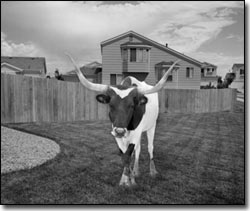 |
Twenty acres
This will be the ninth time
in a day when we pass each other in cars and
trucks. There were more times on foot and farm
equipment. I look at his face and his slab hand
as he raises it with the palm open. I remember
to notice now if he is doing the same. I watch
his eyes and the way his head moves to just but
surely make this contact. These narrow and loose
old roads take a good share of attention. What
I can't be sure of until I ask him tonight, with
more hand gestures and Latin rudiments over sweet
tea or cerveza , is does he want me to know that
he rolls honorably, unarmed and has no intention
of hurting me. We have some history between us.
-Haz
Said |
It is often said that big surprises come in brown paper wrapping.
That wisdom is realized in a slim, unassuming, beige
book of poetry recently published by Durango author
Haz Said. Said's debut book Town and country , offers
profound and memorable glimpses into how life ought to be. Each poem
in the collection is sparingly beautiful, written with a measured and
controlled cadence.
Town and country is the work of a disciplined poet, writing a poem
a week for one year. SaEFd remarked that he finds fodder for his poetry
in his profession as a beekeeper, commenting that both involve a certain
amount of danger: a fear of exposure. Of the original 70 poems, the
final book has been culled down to 24 polished works arranged thematically
into two sections: "The City Proper" and "Off the Grid." Each chapter
opens with a poetic invitation of sorts ("Choosing two" and "Ready road")
to accompany the reader on the poet's journey through various landscapes.
From raw snapshots of rural ranch life to haunting narratives of cityscapes,
Said's brilliant and often powerful imagery remains
etched in the reader's mind for days. At times his
tone is playful, even humorous, but most of his verse
is quietly contemplative, grounded in a keen observation of the natural
world. "Choosing two" will
appeal to all who commute to work on bicycles or who
love a trip through town on their cruisers. In "Apron string," Said
demonstrates his salt as a poet by showcasing his ability to write about
the personal, "I
have erred a living's worth in my quarterlife and/
yet, here well before your dying,/ I have imagined your wings," without
falling into the deadly traps of cliche, pained nostalgia or sentimentality.
Said effectively maintains objective distance from his subject matter
while also cultivating a personal connection with the
reader. He uses understatement to great effect, honestly
painting urban and rural realities with sharpness, clarity and sensitivity.
In "Terminal," Said
captures the humanity and nobility of an aging vagabond
with such powerful images as "An old man mutters/ you never lose your
love for trains/You look for the eyes, past the bb pocks/and switch
furrows." In "A day
where I live" he paints in unforgettable earth tones the daily struggles
of a hungry rancher listening for "her truck /grinding up and grading
the curves in from town. News of the world, and dinner."
The poems unravel in deceptive simplicity, leaving one with the impression
that what has been left unsaid between the lines is just as important
as what has been said.
Said's poetry has been compared to the works of the literary greats
Thomas Hardy and Thorton Wilder, but he has truly cultivated
his own unique style and authentic voice . He demonstrates
amazing versatility as a poet, moving between poetic
prose and tightly structured verse. He delights in playing with language,
and in the surprises that result when words are forced into "differently
shaped containers."
While each poem exists as a separate entity, they work together seamlessly
to present a cohesive picture of our world. Woven throughout are the
themes of family, tradition, love, death, relationships and an appreciation
of nature. SaEFd vividly captures the dual nature of existence for those
of us who are caught between the often conflicting backdrops of the
town and the country.
Town and country's combination of bold but pared-down style
with a positive spin on the ordinary gives the book universal
appeal. This should be true whether you live in "The city proper" or "Off
the grid."
|